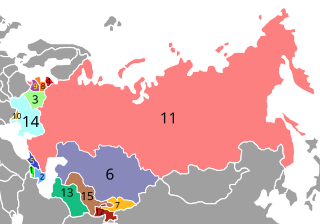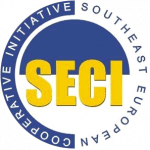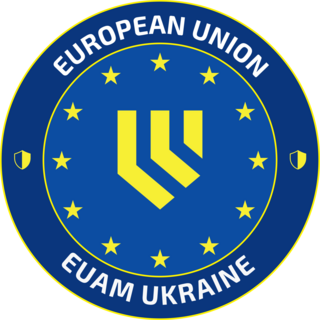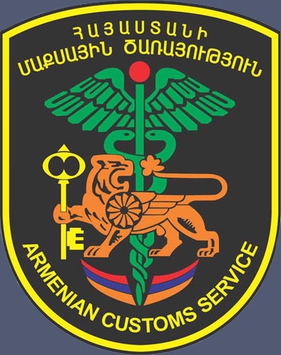
The Commonwealth of Independent States (CIS) is a regional intergovernmental organization in Eurasia. It was formed following the dissolution of the Soviet Union in 1991. It covers an area of 20,368,759 km2 (7,864,422 sq mi) and has an estimated population of 239,796,010. The CIS encourages cooperation in economic, political, and military affairs and has certain powers relating to the coordination of trade, finance, lawmaking, and security, including cross-border crime prevention.

The World Customs Organization (WCO) is an intergovernmental organization headquartered in Brussels, Belgium. The WCO works on customs-related matters including the development of international conventions, instruments, and tools on topics such as commodity classification, valuation, rules of origin, collection of customs revenue, supply chain security, international trade facilitation, customs enforcement activities, combating counterfeiting in support of intellectual property rights (IPR), illegal drug enforcement, combating counterfeiting of medicinal drugs, illegal weapons trading, integrity promotion, and delivering sustainable capacity building to assist with customs reforms and modernization. The WCO maintains the international Harmonized System (HS) goods nomenclature, and administers the technical aspects of the World Trade Organization (WTO) Agreements on Customs Valuation and Rules of Origin.

The Common Foreign and Security Policy (CFSP) is the organised, agreed foreign policy of the European Union (EU) for mainly security and defence diplomacy and actions. CFSP deals only with a specific part of the EU's external relations, which domains include mainly Trade and Commercial Policy and other areas such as funding to third countries, etc. Decisions require unanimity among member states in the Council of the European Union, but once agreed, certain aspects can be further decided by qualified majority voting. Foreign policy is chaired and represented by the EU's High Representative, currently Josep Borrell.

Transnistria, or Pridnestrovie, officially known as the Pridnestrovian Moldavian Republic (PMR), is a breakaway state internationally recognized as part of Moldova. Transnistria controls most of the narrow strip of land between the Dniester river and the Moldova–Ukraine border, as well as some land on the other side of the river's bank. Its capital and largest city is Tiraspol. Transnistria is officially designated by the Republic of Moldova as the Administrative-Territorial Units of the Left Bank of the Dniester or as Stînga Nistrului.

The Eurasian Economic Community was a regional organisation between 2000 and 2014 which aimed for the economic integration of its member states. The organisation originated from the Commonwealth of Independent States (CIS) on 29 March 1996, with the treaty on the establishment of the Eurasian Economic Community signed on 10 October 2000 in Kazakhstan's capital Astana by Presidents Alexander Lukashenko of Belarus, Nursultan Nazarbayev of Kazakhstan, Askar Akayev of Kyrgyzstan, Vladimir Putin of Russia, and Emomali Rahmon of Tajikistan. Uzbekistan joined the community on 7 October 2005, but later withdrew on 16 October 2008.

The post-Soviet states, also referred to as the former Soviet Union (FSU) or the former Soviet republics, are the independent sovereign states that emerged/re-emerged from the dissolution of the Soviet Union in 1991. Prior to their independence, they existed as Union Republics, which were the top-level constituents of the Soviet Union. There are 15 post-Soviet states in total: Armenia, Azerbaijan, Belarus, Estonia, Georgia, Kazakhstan, Kyrgyzstan, Latvia, Lithuania, Moldova, Russia, Tajikistan, Turkmenistan, Ukraine, and Uzbekistan. Each of these countries succeeded their respective Union Republics: the Armenian SSR, the Azerbaijan SSR, the Byelorussian SSR, the Estonian SSR, the Georgian SSR, the Kazakh SSR, the Kirghiz SSR, the Latvian SSR, the Lithuanian SSR, the Moldavian SSR, the Russian SFSR, the Tajik SSR, the Turkmen SSR, the Ukrainian SSR, and the Uzbek SSR. In Russia, the term "near abroad" is sometimes used to refer to the post-Soviet states other than Russia.

The Southeast European Cooperative Initiative (SECI) is a multilateral regional initiative that has been initiated by the European Union, the United States of America and the countries of Southeast Europe within the framework of the Organization for Security and Cooperation in Europe (OSCE) as a support to the implementation of the Dayton Accords in December 1996 at the inaugural session at Geneva on the basis of Final Points of Common EU-USA Understanding.

Relations between the European Union (EU) and Moldova are currently shaped via the European Neighbourhood Policy (ENP), an EU foreign policy instrument dealing with countries bordering its member states.
The European Union Border Assistance Mission at the Rafah Crossing Point is the EU's second Civilian Crisis Management Mission in the Palestinian territories, the other being the European Union Police Mission.

Crime in Transnistria covers criminality-related incidents in the breakaway Republic of Transnistria, still nominally part of Moldova. The police organisations of Transnistria are tasked with fighting crime in the republic.

The Eurasian Economic Union is an economic union of five post-Soviet states located in Eurasia. The EAEU has an integrated single market. As of 2023, it consists of 183 million people and a gross domestic product of over $2.4 trillion.
The Paris summit of September 2008 was a major event in the EU-Ukraine bilateral relations. It was hosted by Nicolas Sarkozy, President of France and president-in-office of the European Council. Also, Javier Solana, the High Representative of the EU for common foreign and security policy and some other high-ranking officials from Brussels attended the event.
The future enlargement of the Eurasian Economic Union is theoretically open to any of the post-Soviet states and potentially any country of Europe or Asia. In order to accede, a state must fulfill certain economic and political requirements. Enlargement of the Eurasian Economic Union is also subject to the consent of all existing members and the candidate's adoption of existing EEU laws and implementing previous decisions made by the Eurasian Economic Commission. The present agenda of the enlargement of the Eurasian Economic Union is primarily focused on Tajikistan. Meanwhile, Moldova was granted Observer Status in April 2017, followed by Uzbekistan and Cuba in December 2020. The process of enlargement is referred to as Eurasian integration or Eurasianism. This term is also used to refer to the intensification of economic cooperation between Eurasian Economic Union member states.
International Organization for Migration (IOM) Mission in Ukraine is an official representative office of the International Organization for Migration in the country and is located in its capital city Kyiv.

Moldova–Transnistria relations are the political and economic relations between the Republic of Moldova and Transnistria, an unrecognized state between the Dniester River and Ukraine. During the dissolution of the Soviet Union, political tensions in the Moldavian Soviet Socialist Republic led to Transnistria declaring independence from Moldova, culminating in the Transnistrian War of 1992. As part of the ceasefire agreement ending the war, a Joint Control Commission composed of Moldovan, Transnistrian, and Russian forces was established to supervise the demilitarized zone which was located in the Transnistrian region. The Joint Control Commission still supervises the zone, and negotiations to resolve the dispute are ongoing. The negotiations are supported by the Russian Federation, Ukraine, the United States, the European Union, and the Organization for Security and Co-operation in Europe (OSCE).

The Moldovan Border Police, also commonly known as the Moldovan Frontier Police, is the official paramilitary border guard of the Republic of Moldova. It is currently a department of the Ministry of Internal Affairs (MAI) and exercises its powers and policy in the accordance with the ministry. It was originally founded as the Border Guard Troops, and later the Border Guard Service of the Armed Forces of the Republic of Moldova.

European Union Advisory Mission Ukraine is a civilian Common Security & Defence Policy (CSDP) mission of the European Union. It aims to assist Ukrainian authorities to reform civilian security sector. It provides strategic advice and practical support to make Ukrainian civilian security sector more effective, efficient, transparent and enjoying public trust. EUAM Ukraine works with a number of law enforcement and rule of law institutions of Ukraine, and it formally began operation on 1 December 2014, following Ukrainian Government's request.

The Association Trio, also known as the Associated Trio, is a tripartite format for the enhanced cooperation, coordination, and dialogue between the Ministries of Foreign Affairs of Georgia, Moldova and Ukraine with the European Union on issues of common interest related to European integration, enhancing cooperation within the framework of the Eastern Partnership, and committing to the prospect of joining the European Union.

The Armenian Customs Service is a subsidiary department of the State Revenue Committee responsible for customs services on behalf of the Armenian government, headquartered in Yerevan.
















